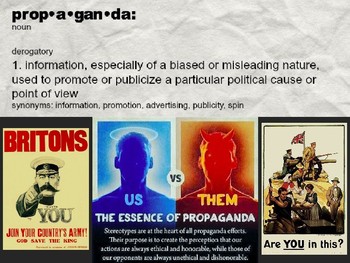Trombetta's Store
14 Followers
Grade Levels
9th - 12th
Subjects
Resource Type
Standards
CCSSWHST.9-10.1
CCSSWHST.9-10.2
CCSSWHST.9-10.2a
CCSSWHST.9-10.4
CCSSWHST.9-10.5
Formats Included
- PPTX
Pages
25 pages
Trombetta's Store
14 Followers
Description
This lesson describes in detail the types of propaganda used throughout the 20th century. There are close to 2 dozen annotated examples along with translated foreign posters as well. Students will emerge from this lesson understanding the definition, purpose, intended audiences, and impact of propaganda. There is also a link to a propaganda analysis form to be used as practice prior to assigning the project. A detailed set of instructions and a rubric are included for students to make their own propaganda posters as a project. Students should work in groups of 2-4 and should be given at least 3-4 days to plan, sketch, and finalize their posters. I've had great success with this project. My students here have created absolutely fantastic posters. Please message or email me for a look at a few of them!
Total Pages
25 pages
Answer Key
Does not apply
Teaching Duration
45 minutes
Last updated May 17th, 2018
Report this resource to TPT
Reported resources will be reviewed by our team. Report this resource to let us know if this resource violates TPT’s content guidelines.
Standards
to see state-specific standards (only available in the US).
CCSSWHST.9-10.1
Write arguments focused on discipline-specific content.
CCSSWHST.9-10.2
Write informative/explanatory texts, including the narration of historical events, scientific procedures/experiments, or technical processes.
CCSSWHST.9-10.2a
Introduce a topic and organize ideas, concepts, and information to make important connections and distinctions; include formatting (e.g., headings), graphics (e.g., figures, tables), and multimedia when useful to aiding comprehension.
CCSSWHST.9-10.4
Produce clear and coherent writing in which the development, organization, and style are appropriate to task, purpose, and audience.
CCSSWHST.9-10.5
Develop and strengthen writing as needed by planning, revising, editing, rewriting, or trying a new approach, focusing on addressing what is most significant for a specific purpose and audience.




